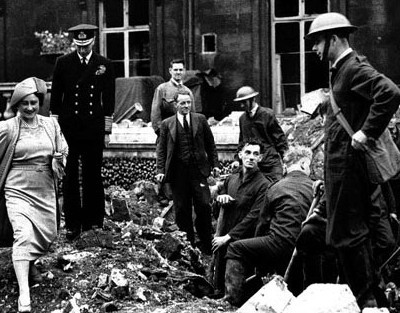Mr Beevor is keener than Mr Hastings on detailing the horror. He is particularly vivid in describing the barbarities that became commonplace during the carnage on the Eastern front. Frozen German corpses littering the battlefield were frequently missing their legs, not because they had been blown off, but because Red Army soldiers wanted their boots and could only pull them off after the legs had been defrosted over camp fires. Outside the besieged city of Leningrad, amputated limbs were stolen from field hospitals and bodies snatched from mass graves as a source of food. Within the city, 2,000 people were arrested for cannibalism. Those most at risk were children, who were eaten by their own parents.

安東尼·比弗也比馬克斯·哈斯丁花了更多筆墨詳細描述二戰所帶來的恐懼。他對士兵暴行的描述特別生動,后來這些暴行在東部戰線的大屠殺中司空見慣。凍僵的德軍尸體遍布戰場,其中很多沒有腿,但那不是被炸掉的,而是蘇聯紅軍想要德軍的靴子,但不用火烤脫不下來。在被包圍的列寧格勒外,戰地醫院中被截下來的腿被人偷走,尸體被人爭相從亂葬崗中挖出來果腹。在列寧格勒,有2000人因吃人而被捕。受害者大多是被父母吃掉的小孩。
The cruelties perpetrated by the Japanese against civilians in China (Mr Beevor sees the Sino-Japanese conflict that began with the Nanking massacre in 1937 as the true opening chapter of the second world war) and any of the countries unfortunate enough to come within the “Greater East Asia Co-Prosperity Sphere” were nearly as systematic as any of the crimes committed by the Nazis. Japanese commanders actively encouraged the dehumanisation of their troops in the belief it would make them more formidable. Prisoners were burned on huge pyres in their thousands and killing local people for meat was officially sanctioned.
日軍在中國(安東尼·比弗視1937年南京大屠殺后開始的中日軍事沖突為第二次世界大戰的真正開端)以及其他不幸被他們納入所謂“大東亞共榮圈”的國家對無辜平民犯下的暴行與德國納粹的行徑一樣是有組織有系統的戰爭罪行。日軍的司令積極鼓勵士兵采取滅絕人性的行動,相信這樣會使士兵更加勇猛。數千戰俘在大柴堆上被燒死,殺死本地人取其肉為食的行為也得到日本軍方的認可。
Mr Beevor also gives more attention than Mr Hastings to the appalling acts of violence suffered by women when invading armies arrived. Again, it was the Japanese who set about mass-rape with methodical zeal. Hundreds of thousands of Chinese and Korean girls were press-ganged into becoming “comfort women”; 10,000 women were gang-raped after the fall of Hong Kong. But revenge-fuelled Red Army soldiers were little better. Soviet forces looting and pillaging their way through East Prussia on their way to Berlin raped around 2m women and girls.
同樣,安東尼·比弗也比馬克斯·哈斯丁更關注婦女在侵略軍到來時所遭受的殘忍對待。日軍還犯下了有組織有計劃的大規模強奸婦女的罪行。數十萬的中國和韓國女孩被強征為“慰安婦”;香港淪陷后有一萬名婦女被輪奸。不過,為報仇而來的蘇聯紅軍也沒好到哪去。蘇聯軍隊穿過東普魯士前往柏林時,一路搶掠,還強奸了近兩百萬名婦女。
This is, however, a less satisfying book than Mr Beevor’s earlier, more focused works. There is an unevenness of quality. The author has a tremendous grasp of the things he has written about before, in particular the titanic struggle between Hitler and Stalin. But he is dutiful rather than exhilarating when dealing with some other passages and theatres of the war. The account of the campaign in north Africa plods, and American readers may be disappointed by his handling of the war in the Pacific. The battle of Midway, arguably the defining naval engagement between Japan and America, gets two pages. At other times, there is too much detail: a succession of generals, armies and battles come and go. Second world war anoraks and students of military history will get more of what they are looking for from Mr Beevor, but less committed readers will find Mr Hastings’s work easier to get to grips with and a better read. Is there room for both books? Absolutely.
不過這本書并不如安東尼·比弗之前的那些內容更為集中的著作,這本書的內容質量參差不齊。安東尼·比弗對他以前所寫的主題鉆研得十分透徹,尤其是希特勒和斯大林之間的劇烈爭斗。不過在處理一些其他章節和戰區時,他只是盡了提到的責任,并沒有寫得出彩。他描寫北非戰役的筆墨十分沉重,而美國讀者可能會他所寫的太平洋戰爭感到失望。被公認為日美兩國戰事轉捩點的中途島戰役只占了兩頁的篇幅,一些其他內容的細節卻太多:一連串的將領、軍隊和戰役如走馬燈似地出現。二戰發燒友和學軍事史的學生會在安東尼·比弗的書中找到更多他們想要的東西,但沒那么狂熱的讀者會覺得馬克斯·哈斯丁的書更容易理解,讀起來更舒服。能不能兩本一起看?當然沒問題。











